高中英语世界名人演讲词35JohnF.Kennedy素材
介绍约翰肯尼迪的英文作文

介绍约翰肯尼迪的英文作文英文:John F. Kennedy, also known as JFK, was the 35th President of the United States. He was born in Brookline, Massachusetts in 1917 and served as President from 1961 until his assassination in 1963. Kennedy was known for his strong leadership skills, charisma, and his ability to inspire people with his speeches.One of his most famous speeches was his inaugural address, where he famously said, "Ask not what your country can do for you, ask what you can do for your country." This quote became a rallying cry for Americans to get involved in their communities and make a difference.Kennedy also played a key role in the Space Race, where he challenged the United States to put a man on the moon by the end of the 1960s. This goal was achieved in 1969, just a few years after his death.In addition to his accomplishments as President, Kennedy is also remembered for his tragic assassination in Dallas, Texas in 1963. His death shocked the nation andleft a lasting impact on American history.中文:约翰·肯尼迪,又称JFK,是美国第35任总统。
英语演讲原文:We choose to go to the Moon speech by John F. Kennedy
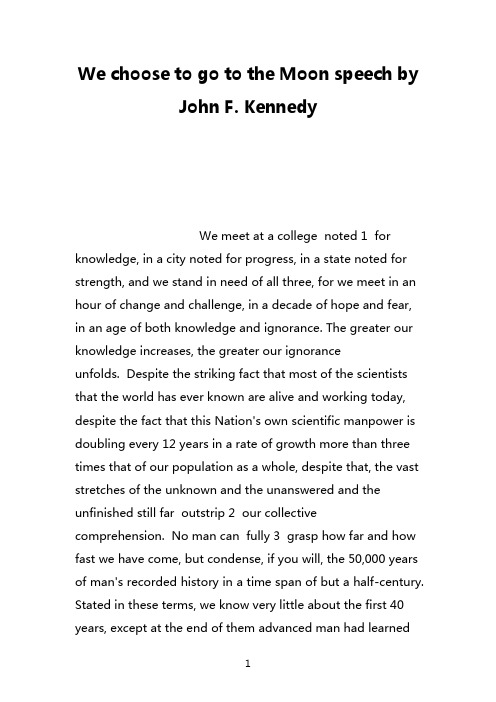
We choose to go to the Moon speech byJohn F. KennedyWe meet at a college noted 1 for knowledge, in a city noted for progress, in a state noted for strength, and we stand in need of all three, for we meet in an hour of change and challenge, in a decade of hope and fear, in an age of both knowledge and ignorance. The greater our knowledge increases, the greater our ignoranceunfolds. Despite the striking fact that most of the scientists that the world has ever known are alive and working today, despite the fact that this Nation's own scientific manpower is doubling every 12 years in a rate of growth more than three times that of our population as a whole, despite that, the vast stretches of the unknown and the unanswered and the unfinished still far outstrip 2 our collective comprehension. No man can fully 3 grasp how far and how fast we have come, but condense, if you will, the 50,000 years of man's recorded history in a time span of but a half-century. Stated in these terms, we know very little about the first 40 years, except at the end of them advanced man had learnedto use the skins of animals to cover them. Then about 10 years ago, under this standard, man emerged from his caves to construct other kinds of shelter. Only five years ago man learned to write and use a cart with wheels. Christianity began less than two years ago. The printing press came this year, and then less than two months ago, during this whole 50-year span of human history, the steam engine provided a new source of power. Newton explored the meaning of gravity. Last month electric lights and telephones and automobiles 5 and airplanes became available. Only last week did we develop penicillin 6 and television and nuclear power, and now if America's new spacecraft succeeds in reaching Venus, we will have literally 7 reached the stars before midnight tonight. This is a breathtaking pace, and such a pace cannot help but create new ills as it dispels 8 old, new ignorance, new problems, new dangers. Surely the opening vistas 9 of space promise high costs and hardships, as well as high reward. So it is not surprising that some would have us stay where we are a little longer to rest, to wait. But this city of Houston, this state of Texas, this country of the United States was not built by those who waited and rested and wished to look behind them. This country was conquered by those who moved forward--and so will space. William Bradford, speaking in 1630 of the founding of the Plymouth Bay Colony, said that all great and honorableactions are accompanied with great difficulties, and both must be enterprised and overcome with answerable courage. If this capsule history of our progress teaches us anything, it is that man, in his quest for knowledge and progress, is determined 10 and cannot be deterred 11 . The exploration of space will go ahead, whether we join in it or not, and it is one of the great adventures of all time, and no nation which expects to be the leader of other nations can expect to stay behind in this race for space. Those who came before us made certain that this country rode the first waves of the industrial revolution, the first waves of modern invention, and the first wave of nuclear power, and this generation does not intend to founder 12 in the backwash of the coming age of space. We mean to be a part of it--we mean to lead it. For the eyes of the world now look into space, to the moon and to the planets beyond, and we have vowed 13 that we shall not see it governed by a hostile flag of conquest, but by a banner of freedom and peace. We have vowed that we shall not see space filled with weapons of mass destruction, but with instruments of knowledge and understanding. Yet the vows 15 of this Nation can only be fulfilled if we in this Nation are first, and, therefore, we intend to be first. In short, our leadership in science and industry, our hopes for peace and security, our obligations to ourselves as well as others, all require us to make this effort, to solvethese mysteries, to solve them for the good of all men, and to become the world's leading space-faring nation. We set sail on this new sea because there is new knowledge to be gained, and new rights to be won, and they must be won and used for the progress of all people. For space science, like nuclear science and all technology, has no conscience of its own. Whether it will become a force for good or ill depends on man, and only if the United States occupies a position of pre-eminence can we help decide whether this new ocean will be a sea of peace or a new terrifying theater of war. I do not say that we should or will go unprotected against the hostile misuse 16 of space any more than we go unprotected against the hostile use of land or sea, but I do say that space can be explored and mastered without feeding the fires of war, without repeating the mistakes that man has made in extending his writ 4 around this globe of ours. There is no strife 17 , no prejudice, no national conflict in outer space as yet. Its hazards are hostile to us all. Its conquest deserves the best of all mankind, and its opportunity for peaceful cooperation many never come again. But why, some say, the moon? Why choose this as our goal? And they may well ask why climb the highest mountain? Why, 35 years ago, fly the Atlantic? Why does Rice play Texas? We choose to go to the moon. We choose to go to the moon in this decade and do the other things, not because they are easy, but because theyare hard, because that goal will serve to organize and measure the best of our energies and skills, because that challenge is one that we are willing to accept, one we are unwilling 18 to postpone 19 , and one which we intend to win, and the others, too. It is for these reasons that I regard the decision last year to shift our efforts in space from low to high gear as among the most important decisions that will be made during my incumbency 20 in the office of the Presidency 21 . In the last 24 hours we have seen facilities now being created for the greatest and most complex exploration in man's history. We have felt the ground shake and the air shattered by the testing of a Saturn 22 C-1 booster rocket, many times as powerful as the Atlas 23 which launched John Glenn, generating power equivalent to 10,000 automobiles with their accelerators on the floor. We have seen the site where five F-1 rocket engines, each one as powerful as all eight engines of the Saturn combined, will be clustered together to make the advanced Saturn missile, assembled in a new building to be built at Cape 24 Canaveral as tall as a 48 story structure, as wide as a city block, and as long as two lengths of this field. Within these last 19 months at least 45 satellites have circled the earth. Some 40 of them were made in the United States of America and they were far more sophisticated and supplied far more knowledge to the people of the world than those of theSoviet 25 Union. The Mariner 26 spacecraft now on its way to Venus is the most intricate instrument in the history of space science. The accuracy of that shot is comparable to firing a missile from Cape Canaveral and dropping it in this stadium between the 40-yard lines. Transit satellites are helping 27 our ships at sea to steer 28 a safer course. Tiros satellites have given us unprecedented 29 warnings of hurricanes and storms, and will do the same for forest fires and icebergs 30 . We have had our failures, but so have others, even if they do not admit them. And they may be less public. To be sure, we are behind, and will be behind for some time in manned flight. But we do not intend to stay behind, and in this decade, we shall make up and move ahead. The growth of our science and education will be enriched by new knowledge of our universe and environment, by new techniques of learning and mapping and observation, by new tools and computers for industry, medicine, the home as well as the school. Technical institutions, such as Rice, will reap the harvest of these gains. And finally, the space effort itself, while still in its infancy 31 , has already created a great number of new companies, and tens of thousands of new jobs. Space and related industries are generating new demands in investment and skilled personnel, and this city and this state, and this region, will share greatly in this growth. What was once the furthest outpost on the oldfrontier of the West will be the furthest outpost on the new frontier of science and space. Houston, your city of Houston, with its Manned Spacecraft Center, will become the heart of a large scientific and engineering community. During the next 5 years the National Aeronautics 32 and Space Administration expects to double the number of scientists and engineers in this area, to increase its outlays 33 for salaries and expenses to $60 million a year; to invest some $200 million in plant and laboratory facilities; and to direct or contract for new space efforts over $1 billion from this center in this city. To be sure, all this costs us all a good deal of money. This year's space budget is three times what it was in January 1961, and it is greater than the space budget of the previous eight years combined. That budget now stands at $5,400 million a year--a staggering sum, though somewhat less than we pay for cigarettes and cigars every year. Space expenditures 34 will soon rise some more, from 40 cents per person per week to more than 50 cents a week for every man, woman and child in the United States, for we have given this program a high national priority--even though I realize that this is in some measure an act of faith and vision, for we do not now know what benefits await us. But if I were to say, my fellow citizens, that we shall send to the moon, 240,000 miles away from the control station in Houston, a giant rocket more than 300 feet tall, the length of this football field, made of new metalalloys 35 , some of which have not yet been invented, capable of standing 14 heat and stresses several times more than have ever been experienced, fitted together with a precision better than the finest watch, carrying all the equipment needed for propulsion, guidance, control, communications, food and survival, on an untried mission, to an unknown celestial 36 body, and then return it safely to earth, re-entering the atmosphere at speeds of over 25,000 miles per hour, causing heat about half that of the temperature of the sun--almost as hot as it is here today--and do all this, and do it right, and do it first before this decade is out--then we must be bold. I'm the one who is doing all the work, so we just want you to stay cool for a minute. [laughter] However, I think we're going to do it, and I think that we must pay what needs to be paid. I don't think we ought to waste any money, but I think we ought to do the job. And this will be done in the decade of the Sixties. It may be done while some of you are still here at school at this college and university. It will be done during the terms of office of some of the people who sit here on this platform. But it will be done. And it will be done before the end of this decade. And I am delighted that this university is playing a part in putting a man on the moon as part of a great national effort of the United States of America. Many years ago the great British explorer George Mallory, who was to die on Mount Everest, was asked why didhe want to climb it. He said, "Because it is there." Well, space is there, and we're going to climb it, and the moon and the planets are there, and new hopes for knowledge and peace are there. And, therefore, as we set sail we ask God's blessing 37 on the most hazardous 38 and dangerous and greatest adventure on which man has ever embarked 39 .■文章重点单词注释:1notedadj.著名的,知名的参考例句:The local hotel is noted for its good table.当地的那家酒店以餐食精美而著称。
十大名人英语演讲稿
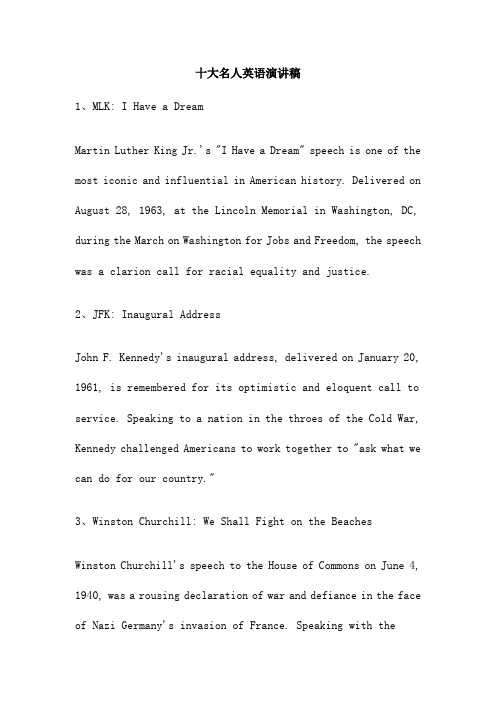
十大名人英语演讲稿1、MLK: I Have a DreamMartin Luther King Jr.'s "I Have a Dream" speech is one of the most iconic and influential in American history. Delivered on August 28, 1963, at the Lincoln Memorial in Washington, DC, during the March on Washington for Jobs and Freedom, the speech was a clarion call for racial equality and justice.2、JFK: Inaugural AddressJohn F. Kennedy's inaugural address, delivered on January 20, 1961, is remembered for its optimistic and eloquent call to service. Speaking to a nation in the throes of the Cold War, Kennedy challenged Americans to work together to "ask what we can do for our country."3、Winston Churchill: We Shall Fight on the BeachesWinston Churchill's speech to the House of Commons on June 4, 1940, was a rousing declaration of war and defiance in the face of Nazi Germany's invasion of France. Speaking with theauthority of a British bulldog, Churchill vowed that "we shall fight on the beaches, we shall fight on the landing grounds, we shall fight in the fields and in the streets, we shall fight in the hills; we shall never surrender."4、John F. Kennedy: Address at Rice UniversityOn September 12, 1962, John F. Kennedy delivered an address to Rice University in Houston that was a clarion call for American space exploration and scientific discovery. Speaking to a nation still reeling from the Soviet Union's lead in space exploration, Kennedy challenged the country to go to the moon and beyond, saying, "We choose to go to the moon in this decade and do the other things not because they are easy but because they are hard."5、Barack Obama: 2004 Democratic National Convention Keynote AddressBarack Obama's keynote address at the 2004 Democratic National Convention launched his national political career and set the stage for a groundbreaking presidency. Speaking with optimismand urgency, Obama challenged Americans to put aside partisan politics and work together to solve the country's problems.6、MLK: Beyond Vietnam - A Time to Break SilenceOn April 4, 1967, Martin Luther King Jr. delivered a speech at New York's Riverside Church that was a scathing critique of the Vietnam War and America's unjust systems of poverty and violence. Speaking from his pulpit as a prophet of peace, King called for an end to the war and a rejection of violence and war machines in favor of love and peace.7、Ronald Reagan: Address to the Nation on Tax ReformOn February 5, 1981, Ronald Reagan gave an address to the nation outlining his vision for tax reform. Speaking with his trademark optimism and charm, Reagan challenged Congress to pass legislation that would simplify the tax code, reduce rates, and spur economic growth.8、JFK: Address at American UniversityJohn F. Kennedy's address at American University on June 10,1963, was a plea for peace in the nuclear age and a clarion call for cooperation between nations. Speaking at a time when the world was on edge due to Cold War tensions, Kennedy called fora reduction in nuclear weapons and an end to the arms race.9、FDR: Pearl Harbor Address to the NationFranklin D. Roosevelt's address to the nation on December 7, 1941, following the attack on Pearl Harbor, was a call to arms and a declaration of war against Japan. Speaking with resolve and anger, Roosevelt vowed that "our country demands action now...we will always remember...and we will always honor...those who died here.名人小故事演讲稿尊敬的评委、亲爱的听众们:大家好!今天我要跟大家分享的是“名人小故事演讲稿”。
美文欣赏:肯尼迪总统就职演说(双语

美文欣赏:肯尼迪总统就职演说(双语First Inaugural Address 肯尼迪总统就职演说We observe today not a victory of party, but a celebration of freedom, symbolizing an end, as well as a beginning; signifying renewal, as well as change. For I have sworn before you and Almighty God the same solemn oath our forebears prescribed nearly a century and three quarters ago.今天我们庆祝的不是政党的胜利,而是自由的胜利。
这象征着一个结束,也象征着一个开端;意味着延续也意味看变革。
因为我已在你们和全能的上帝面前,宣读了我们的先辈在170多年前拟定的庄严誓言。
In your hands, my fellow citizens, more than in mine, will rest the final successor failure of our course. Since this country was founded, each generation of Americans has been summoned to give testimony to its national loyalty. The graves of young Americans who answered the call to service surround the globe. 公民们,我们方针的最终成败与其说掌握在我手中,不如说掌握在你们手中。
自从合众国建立以来,每一代美国人都曾受到召唤去证明他们对国家的忠诚。
响应召唤而献身的美国青年的坟墓遍及全球。
肯尼迪英文演讲稿
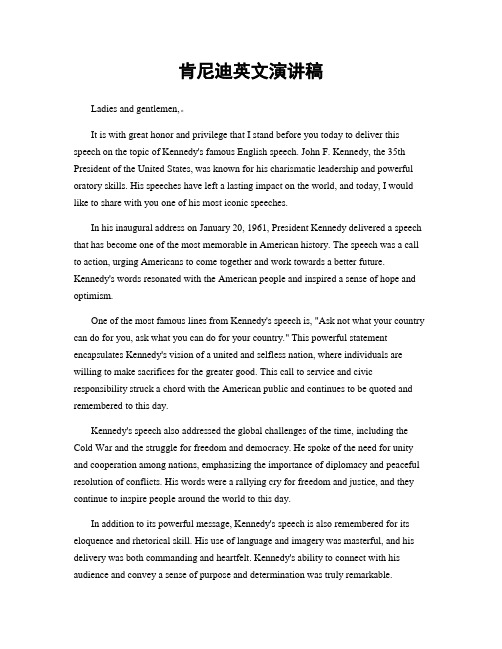
肯尼迪英文演讲稿Ladies and gentlemen,。
It is with great honor and privilege that I stand before you today to deliver this speech on the topic of Kennedy's famous English speech. John F. Kennedy, the 35th President of the United States, was known for his charismatic leadership and powerful oratory skills. His speeches have left a lasting impact on the world, and today, I would like to share with you one of his most iconic speeches.In his inaugural address on January 20, 1961, President Kennedy delivered a speech that has become one of the most memorable in American history. The speech was a call to action, urging Americans to come together and work towards a better future. Kennedy's words resonated with the American people and inspired a sense of hope and optimism.One of the most famous lines from Kennedy's speech is, "Ask not what your country can do for you, ask what you can do for your country." This powerful statement encapsulates Kennedy's vision of a united and selfless nation, where individuals are willing to make sacrifices for the greater good. This call to service and civic responsibility struck a chord with the American public and continues to be quoted and remembered to this day.Kennedy's speech also addressed the global challenges of the time, including the Cold War and the struggle for freedom and democracy. He spoke of the need for unity and cooperation among nations, emphasizing the importance of diplomacy and peaceful resolution of conflicts. His words were a rallying cry for freedom and justice, and they continue to inspire people around the world to this day.In addition to its powerful message, Kennedy's speech is also remembered for its eloquence and rhetorical skill. His use of language and imagery was masterful, and his delivery was both commanding and heartfelt. Kennedy's ability to connect with his audience and convey a sense of purpose and determination was truly remarkable.In conclusion, Kennedy's English speech is a timeless example of leadership and inspiration. His words continue to resonate with people of all ages and backgrounds, and his vision of a better future remains as relevant today as it was over half a century ago. As we reflect on the legacy of President Kennedy, let us remember the power of his words and the enduring impact of his leadership.Thank you.。
经典英文演讲 肯尼迪Towards a Strategy of Peace kennedy

Modern History Sourcebook:President John F. Kennedy:Towards a Strategy of Peace, June 10, 1963--------------------------------------------------------------------------------Address by President Kennedy at The American University, Washington, D.C., June 10, 1963[]I have . . . chosen this time and this place to discuss a topic on which ignorance too often abounds and the truth is too rarely perceived-yet it is the most important topic on earth: world peace.What kind of peace do I mean? What kind of peace do we seek? Not a Pax Americana enforced on the world by American weapons of war. Not the peace of the grave or the security of the slave.I am talking about genuine peace, the kind of peace that makes life on earth worth living, the kind that enables men and nations to grow and to hope and to build a better life for their children-not merely peace for Americans but peace for all men and women, not merely peace in our time but peace for all time. .First: Let us examine our attitude toward peace itself. Too many of us think it is impossible. Too many think it unreal. But that is a dangerous, defeatist belief. It leads to the conclusion that war is inevitable, that mankind is doomed, that we are gripped by forces we cannot control.We need not accept that view. Our problems are manmade; therefore they can be solved by man. And man can be as big as be wants. No problem of human destiny is beyond human beings. Man's reason and spirit have often solved the seemingly unsolvable, and we believe they can do it again.I am not referring to the absolute, infinite concept of universal peace and good will of which some fantasies and fanatics dream. I do not deny the values of hopes and dreams, but we merely invite discouragement and incredulity by making that our only and immediate goal.Let us focus instead on a more practical, more attainable peace, based not on a sudden revolution in human nature but on a gradual evolution in human institutions -on a series of concrete actions and effective agreements which are in the interest of all concerned. There is no single, simple key to this peace, no grand or magic formula to be adopted by one or two powers. Genuine peace must be the product of many nations, the sum of many acts. It must be dynamic, not static, changing to meet the challenge of each new generation. For peace is a process, a way of solving problems.With such a peace there will still be quarrels and conflicting interests, as there are within families and nations. World peace, like community peace, does not require that each man love hisneighbor; it requires only that they live together in mutual tolerance, submitting their disputes to a just and peaceful settlement. . . .Second: Let us reexamine our attitude toward the Soviet Union.No government or social system is so evil that its people must be considered as lacking in virtue. As Americans we find communism profoundly repugnant as a negation of personal freedom and dignity. But we can still hail the Russian people for their many achievements-in science and space, in economic and industrial growth, in culture and in acts of courage.Among the many traits the peoples of our two countries have in common, none is stronger than our mutual abhorrence of war. Almost unique among the major world powers, we have never been at war with each other. And no nation in the history of battle ever suffered more than the Soviet Union suffered in the course of the Second World War. . . .Today, should total war ever break out again-no matter how-our two countries would become the primary targets. It is an ironical but accurate fact that the two strongest powers are the two in the most danger of devastation. All we have built, all we have worked for, would be destroyed in the first 24 hours. And even in the cold war, which brings burdens and dangers to so many countries - including this nation's closest allies - our two countries bear the heaviest burdens. For we are both devoting massive sums of money to weapons that could be better devoted to combating ignorance, poverty, and disease. We are both caught up in a vicious and dangerous cycle in which suspicion on one side breeds suspicion on the other and new weapons beget counter-weapons.In short, both the United States and its allies, and the Soviet Union and its allies, have a mutually deep interest in a just and genuine peace and in halting the arms race. Agreements to this end arc in the interests of the Soviet Union as well as ours, and even the most hostile nations can be relied upon to accept and keep those treaty obligations, and only those treaty obligations, which are in their own interest. . . .Third: Let us reexamine our attitude toward the cold war, remembering that we are not engaged in a debate, seeking to pile up debating points. We are not here distributing blame or pointing the finger of judgment. We must deal with the world as it is and not as it might have been bad the history of the last 18 years been different. . . .Speaking of other nations, I wish to make one point clear. We are bound to many nations by alliances. Those alliances exist because our concern and theirs substantially overlap. Our commitment to defend Western Europe and West Berlin, for example, stands undiminished because of the identity of our vital interests. The United States will make no deal with the Soviet Union at the expense of other nations and other peoples, not merely because they are our partners but also because their interests and ours converge.Our interests converge, however, not only in defending the frontiers of freedom but in pursuingthe paths of peace. It is our hope-and the purpose of Allied policies-to convince the Soviet Union that she, too, should let each nation choose its own future, so long as that choice does not interfere with the choices of others. The Communist drive to impose their political and economic system on others is the primary cause of world tension today. For there can be no doubt that, if all nations could refrain from interfering in the self-determination of others, the peace would be much more assured. . . .I am taking this opportunity . . . to announce two important decisions . . .First: Chairman Khrushchev, Prime Minister Macmillan, and I have agreed that high-level discussions will shortly begin in Moscow looking toward early agreement on a comprehensive test ban treaty. Our hopes must be tempered with the caution of history, but with our hopes go the hopes of all mankind.Second: To make clear our good faith and solemn convictions on the matter, I now declare that the United States does not propose to conduct nuclear tests in the atmosphere so long as other states do not do so. We will not be the first to resume. Such a declaration is no substitute for a formal binding treaty, but I hope it will help us achieve one. Nor would such a treaty be a substitute for disarmament, but I hope it will help us achieve it.Finally, my fellow Americans, let us examine our attitude toward peace and freedom here at home. The quality and spirit of our own society must justify and support our efforts abroad. . . .It is the responsibility of the executive branch at all levels of government -local, State, and national-to provide and protect that freedom for all of our citizens by all means within their authority. It is the responsibility of the legislative branch at all levels, wherever that authority is not now adequate, to make it adequate. And it is the responsibility of all citizens in all sections of this country to respect the rights of all others and to respect the law of the land. . . .While we proceed to safeguard our national interests, let us also safeguard human interests. And the elimination of war and arms is clearly in the interest of both. No treaty, however much it may be to the advantage of all, however tightly it may be worded, can provide absolute security against the risks of deception and evasion. But it can, if it is sufficiently effective in its enforcement and if it is sufficiently in the interests of its signers, offer far more security and far fewer risks than an unabated, uncontrolled, unpredictable arms race.The United States, as the world knows, will never start a war. We do not want a war. We do not now expect a war. This generation of Americans has already had enough - more than enough-of war and hate and oppression. We shall be prepared if others wish it. We shall be alert to try to stop it. But we shall also do our part to build a world of peace where the weak are safe and the strong are just. We are not helpless before that task or hopeless of its success. Confident and unafraid, we labor on-not toward a strategv of annihilation but toward a strategy of peace.。
肯尼迪就职的演说稿

肯尼迪就职的演说稿John F. Kennedy: Inaugural AddressVice President Johnson, Mr. Speaker, Mr. Chief Justice, President Eisenhower, Vice President Nixon, President Truman, Reverend Clergy, fellow citizens:We observe today not a victory of party, but a celebration of freedom symbolizing an end, as well as a beginning signifying renewal, as well as change. For I have sworn before you and Almighty God the same solemn oath our forebears prescribed nearly a century and three quarters ago.The world is very different now. For man holds in his mortal hands the power to abolish all forms of human poverty and all forms of human life. And yet the same revolutionary beliefs for which our forebears fought are still at issue around the globe the belief that the rights of man come not from the generosity of the state, but from the hand of God.We dare not forget today that we are the heirs of that first revolution. Let the word go forth from this time and place, to friend and foe alike, that the torch has been passed to a newgeneration of Americans born in this century, tempered by war, disciplined by a hard and bitter peace, proud of our ancient heritage, and unwilling to witness or permit the slow undoing of those human rights to which this nation has always been committed, and to which we are committed today at home and around the world.Let every nation know, whether it wishes us well or ill, that we shall pay any price, bear any burden, meet any hardship, support any friend, oppose any foe, to assure the survival and the success of liberty.This much we pledge -- and more.To those old allies whose cultural and spiritual origins we share, we pledge the loyalty of faithful friends. United there is little we cannot do in a host of cooperative ventures. Divided there is little we can do for we dare not meet a powerful challenge at odds and split asunder.To those new states whom we welcome to the ranks of the free, we pledge our word that one form of colonial control shall not have passed away merely to be replaced by a far more iron tyranny. We shall not always expect to find them supporting our view. But we shall always hope to find them strongly supporting their own freedom and to remember that, in the past, those whofoolishly sought power by riding the back of the tiger ended up inside.。
总统肯尼迪 英文作文
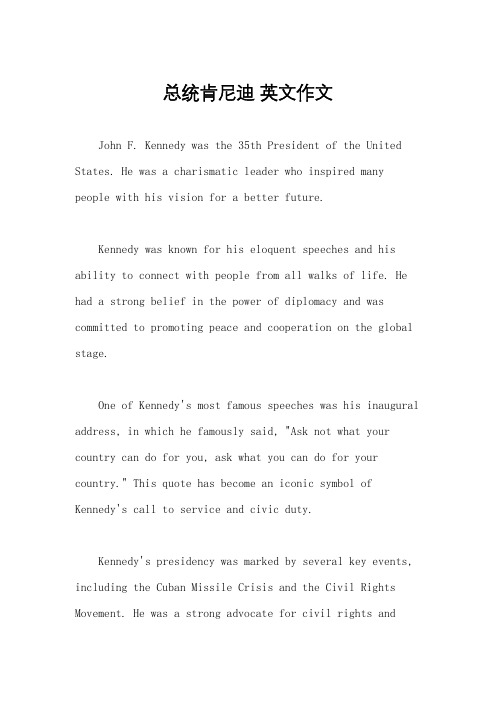
总统肯尼迪英文作文John F. Kennedy was the 35th President of the United States. He was a charismatic leader who inspired many people with his vision for a better future.Kennedy was known for his eloquent speeches and his ability to connect with people from all walks of life. He had a strong belief in the power of diplomacy and was committed to promoting peace and cooperation on the global stage.One of Kennedy's most famous speeches was his inaugural address, in which he famously said, "Ask not what your country can do for you, ask what you can do for your country." This quote has become an iconic symbol of Kennedy's call to service and civic duty.Kennedy's presidency was marked by several key events, including the Cuban Missile Crisis and the Civil Rights Movement. He was a strong advocate for civil rights andworked to advance equality and justice for all Americans.Tragically, Kennedy's presidency was cut short when he was assassinated in 1963. His untimely death was a great loss to the nation, but his legacy continues to inspire people around the world.Overall, Kennedy's presidency was a time of hope and optimism. He brought a new sense of energy and vitality to the White House, and his vision for a better future continues to resonate with people today.。
肯尼迪就职演讲稿英文(共6篇)
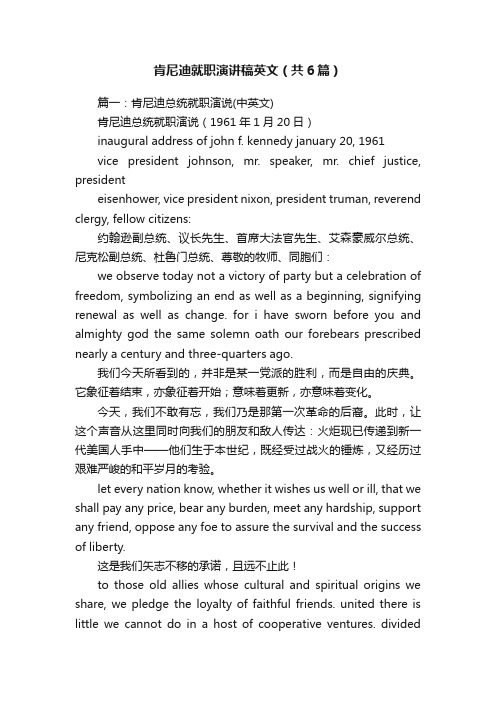
肯尼迪就职演讲稿英文(共6篇)篇一:肯尼迪总统就职演说(中英文)肯尼迪总统就职演说(1961年1月20日)inaugural address of john f. kennedy january 20, 1961vice president johnson, mr. speaker, mr. chief justice, presidenteisenhower, vice president nixon, president truman, reverend clergy, fellow citizens:约翰逊副总统、议长先生、首席大法官先生、艾森豪威尔总统、尼克松副总统、杜鲁门总统、尊敬的牧师、同胞们:we observe today not a victory of party but a celebration of freedom, symbolizing an end as well as a beginning, signifying renewal as well as change. for i have sworn before you and almighty god the same solemn oath our forebears prescribed nearly a century and three-quarters ago.我们今天所看到的,并非是某一党派的胜利,而是自由的庆典。
它象征着结束,亦象征着开始;意味着更新,亦意味着变化。
今天,我们不敢有忘,我们乃是那第一次革命的后裔。
此时,让这个声音从这里同时向我们的朋友和敌人传达:火炬现已传递到新一代美国人手中——他们生于本世纪,既经受过战火的锤炼,又经历过艰难严峻的和平岁月的考验。
let every nation know, whether it wishes us well or ill, that we shall pay any price, bear any burden, meet any hardship, support any friend, oppose any foe to assure the survival and the success of liberty.这是我们矢志不移的承诺,且远不止此!to those old allies whose cultural and spiritual origins we share, we pledge the loyalty of faithful friends. united there is little we cannot do in a host of cooperative ventures. dividedthere is little we can do, for we dare not meet a powerful challenge at odds and split asunder. 对于那些与我们共享同一文化和精神源头的老朋友,我们许以朋友的忠诚。
肯尼迪演讲稿中英对照
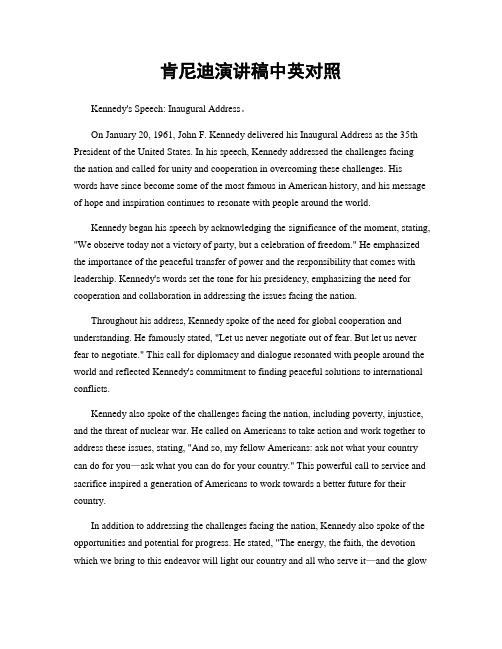
肯尼迪演讲稿中英对照Kennedy's Speech: Inaugural Address。
On January 20, 1961, John F. Kennedy delivered his Inaugural Address as the 35th President of the United States. In his speech, Kennedy addressed the challenges facing the nation and called for unity and cooperation in overcoming these challenges. His words have since become some of the most famous in American history, and his message of hope and inspiration continues to resonate with people around the world.Kennedy began his speech by acknowledging the significance of the moment, stating, "We observe today not a victory of party, but a celebration of freedom." He emphasized the importance of the peaceful transfer of power and the responsibility that comes with leadership. Kennedy's words set the tone for his presidency, emphasizing the need for cooperation and collaboration in addressing the issues facing the nation.Throughout his address, Kennedy spoke of the need for global cooperation and understanding. He famously stated, "Let us never negotiate out of fear. But let us never fear to negotiate." This call for diplomacy and dialogue resonated with people around the world and reflected Kennedy's commitment to finding peaceful solutions to international conflicts.Kennedy also spoke of the challenges facing the nation, including poverty, injustice, and the threat of nuclear war. He called on Americans to take action and work together to address these issues, stating, "And so, my fellow Americans: ask not what your country can do for you—ask what you can do for your country." This powerful call to service and sacrifice inspired a generation of Americans to work towards a better future for their country.In addition to addressing the challenges facing the nation, Kennedy also spoke of the opportunities and potential for progress. He stated, "The energy, the faith, the devotion which we bring to this endeavor will light our country and all who serve it—and the glowfrom that fire can truly light the world." Kennedy's words conveyed a sense of optimism and hope, inspiring people to believe in the possibility of a better future.Kennedy's Inaugural Address has become one of the most famous speeches in American history, and its message continues to resonate with people around the world. His call for unity, cooperation, and service has inspired generations of Americans to work towards a better future for their country. As we reflect on Kennedy's words, we are reminded of the power of leadership and the importance of working together to overcome the challenges we face. Kennedy's legacy continues to inspire us to strive for a world of peace, justice, and progress.。
肯尼迪总统就职演讲中英版
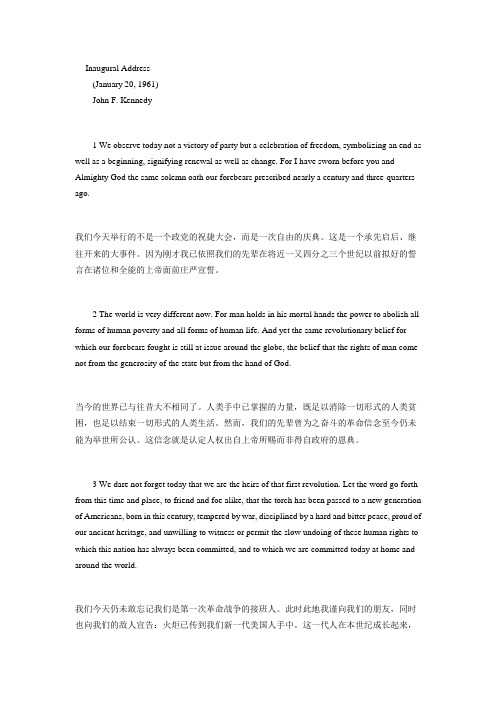
Inaugural Address(January 20, 1961)John F. Kennedy1 We observe today not a victory of party but a celebration of freedom, symbolizing an end as well as a beginning, signifying renewal as well as change. For I have sworn before you and Almighty God the same solemn oath our forebears prescribed nearly a century and three-quarters ago.我们今天举行的不是一个政党的祝捷大会,而是一次自由的庆典。
这是一个承先启后、继往开来的大事件。
因为刚才我已依照我们的先辈在将近一又四分之三个世纪以前拟好的誓言在诸位和全能的上帝面前庄严宣誓。
2 The world is very different now. For man holds in his mortal hands the power to abolish all forms of human poverty and all forms of human life. And yet the same revolutionary belief for which our forebears fought is still at issue around the globe, the belief that the rights of man come not from the generosity of the state but from the hand of God.当今的世界已与往昔大不相同了。
人类手中已掌握的力量,既足以消除一切形式的人类贫困,也足以结束一切形式的人类生活。
约翰·肯尼迪就职演讲
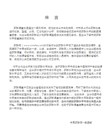
To our sister republics south of our border, we offer a special pledge: to convert our good words into good deeds, in a new alliance for progress, to assist free men and free governments in casting off the chains of poverty. But this peaceful revolution of hope cannot become the prey of hostile powers. Let all our neighbors know that we shall join with them to oppose aggression or subversion anywhere in the Americas. And let every other power know that this hemisphere intends to remain the master of its own house.
To those old allies whose cultural and spiritual origins we share, we pledge the loyalty of faithful friends. United there is little we cannot do in a host of cooperative ventures. Divided there is little we can do -- for we dare not meet a powerful challenge at odds and split asunder.
肯尼迪总统演讲英语作文
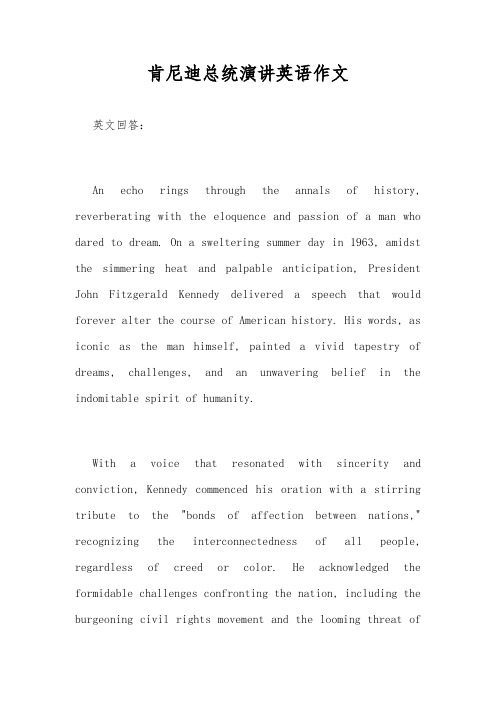
肯尼迪总统演讲英语作文英文回答:An echo rings through the annals of history, reverberating with the eloquence and passion of a man who dared to dream. On a sweltering summer day in 1963, amidst the simmering heat and palpable anticipation, President John Fitzgerald Kennedy delivered a speech that would forever alter the course of American history. His words, as iconic as the man himself, painted a vivid tapestry of dreams, challenges, and an unwavering belief in the indomitable spirit of humanity.With a voice that resonated with sincerity and conviction, Kennedy commenced his oration with a stirring tribute to the "bonds of affection between nations," recognizing the interconnectedness of all people, regardless of creed or color. He acknowledged the formidable challenges confronting the nation, including the burgeoning civil rights movement and the looming threat ofnuclear war, yet he refused to succumb to despair.Kennedy's vision for the future was audacious, yet grounded in a profound faith in the potential of the American people. He called for a renewed commitment to space exploration, proposing a daring and unprecedented mission to land a man on the moon before the end of the decade. With these ambitious aspirations, he sought to inspire a nation to transcend its earthly limitations and embrace the boundless possibilities of the unknown.But Kennedy's speech was more than mere rhetoric. It was a clarion call to action, urging his fellow countrymen to confront the social and political injustices that plagued society. He denounced racial discrimination as a "moral crisis" and implored Americans to "meet the challenge of change." His words resonated deeply with the hearts and minds of a nation on the cusp of a transformative era.Kennedy's message transcended the boundaries of time and space, becoming an enduring symbol of hope and unity. Itignited a spirit of optimism and determination, fueling the civil rights movement and inspiring generations of Americans to strive for a more just and equitable society. His legacy continues to inspire and challenge us today, reminding us of the power of words to shape history and the indomitable spirit that resides within each of us.中文回答:历史的年轮上回荡着一段回响,它承载着一位敢于有梦之人的雄辩和激情。
【名人演讲】约翰·菲茨杰拉德·肯尼迪:总统就职演说

【名人演讲】约翰·菲茨杰拉德·肯尼迪:总统就职演说总统就职演说(美国)约翰·菲茨杰拉德·肯尼迪约翰逊副总统、议长先生、首席大法官先生、艾森豪威尔总统、尼克松副总统、杜鲁门总统、尊敬的牧师、同胞们:我们今天庆祝的并不是一次政党的胜利,而是一次自由的庆典;它象征着结束,也象征着开始;意味着更新,也意味着变革。
因为我已在你们和全能的上帝面前庄严宣誓,誓言和将近175年前我们先辈所作的誓言完全一样。
现今世界已经很不同了,因为人在自己血肉之躯的手中握有的力量足以消灭一切形式的人类贫困和一切形式的人类生命。
可是我们祖先奋斗不息所维护的革命信念,在世界各地仍处于争论之中。
那信念就是注定人权并非来自政府的慷慨施与,而是上帝所赐。
我们今天不敢忘记我们是第一次革命的继承人,让我从此时此地告诉我们的朋友,并且也告诉我们的敌人,这支火炬已经传递给新一代的美国人,他们出生在本世纪,经历过战争的锻炼,接受了一个严峻、艰苦的和平时期的考验,以我们继承的古代传统而自豪,而且不愿目睹或容许人权逐步被褫夺。
对于这些人权我国一向坚定不移,当前在国内和全世界我们也是对此力加维护的。
让每一个国家知道,不管它盼我们好或盼我们坏,我们将不惜任何代价,忍受任何重负,应付任何艰辛,支持任何朋友,反对任何敌人,以确保自由的存在与实现。
这是我们矢志不移的事业——而且还不止如此。
对于那些和我们拥有共同文化和精神传统的老盟友,我们保证以挚友之诚相待。
只要团结,则在许多合作事业中几乎没有什么是办不到的。
倘若分裂,我们则无可作为,因为我们在意见分歧、各行其是的情况下,是不敢应付强大挑战的。
对于那些我们欢迎其参与自由国家行列的新国家,我们要作出保证,绝不让一种形式的殖民统治消失后,却代之以另一种远为残酷的暴政。
我们不能总是期望他们会支持我们的观点,但我们却一直希望他们能坚决维护他们自身的自由,并应记住,在过去,那些愚蠢得要骑在虎背上以壮声势的人,无不葬身虎腹。
肯尼迪总统就职演说英文版
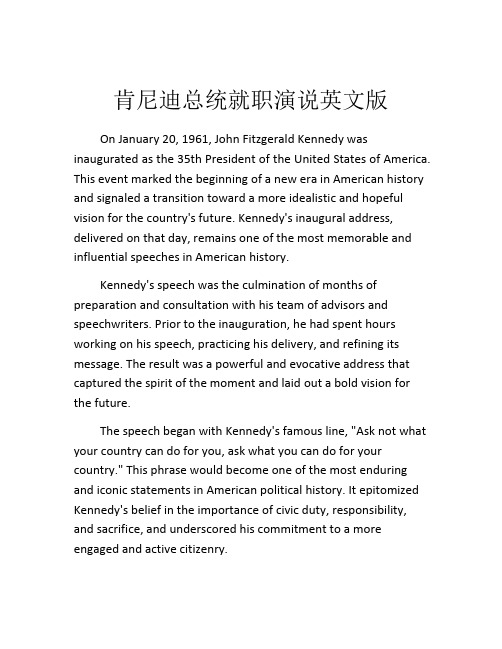
肯尼迪总统就职演说英文版On January 20, 1961, John Fitzgerald Kennedy was inaugurated as the 35th President of the United States of America. This event marked the beginning of a new era in American history and signaled a transition toward a more idealistic and hopeful vision for the country's future. Kennedy's inaugural address, delivered on that day, remains one of the most memorable and influential speeches in American history.Kennedy's speech was the culmination of months of preparation and consultation with his team of advisors and speechwriters. Prior to the inauguration, he had spent hours working on his speech, practicing his delivery, and refining its message. The result was a powerful and evocative address that captured the spirit of the moment and laid out a bold vision for the future.The speech began with Kennedy's famous line, "Ask not what your country can do for you, ask what you can do for your country." This phrase would become one of the most enduring and iconic statements in American political history. It epitomized Kennedy's belief in the importance of civic duty, responsibility, and sacrifice, and underscored his commitment to a more engaged and active citizenry.The rest of the speech was equally inspiring, with Kennedy outlining his vision for America's future both at home and abroad. He spoke of the need to confront the challenges of poverty, racism, and inequality head-on, and to work toward a more just and equitable society. He also emphasized the importance of U.S. leadership on the global stage, calling for a renewed commitment to diplomacy, cooperation, and peace.As Kennedy spoke, his words resonated deeply with the American people, who were hungry for a new vision and a new direction. In the wake of the Cold War and the political and social upheavals of the 1950s, Kennedy's message of hope, idealism, and optimism struck a chord. He represented a break from the old politics of division and fear, and a new era of cooperation and progress.Over the years, Kennedy's inaugural address has become a touchstone for generations of Americans, serving as a symbol of America's commitment to justice, equality, and freedom. Its message of personal responsibility, sacrifice, and hard work continues to inspire and energize people both in the U.S. and around the world, encouraging them to see themselves as builders and creators of a better future.In the end, Kennedy's speech was more than just a call to action. It was a rallying cry for a new generation of Americans, a signpost pointing the way to a better, more inclusive, and more equitable future for all. And though Kennedy himself did not liveto see that future come to pass, his legacy lives on, inspiring countless others to take up the torch and carry forward his vision of a brighter tomorrow.。
约翰·肯尼迪就职演说 -英语演讲稿
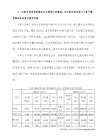
To that world assembly of sovereign states, the United Nations, our last best hope in an age where the instruments of war have far outpaced the instruments of peace, we renew our pledge of support -- to prevent it from becoming merely a forum for invective, to strengthen its shield of the new and the weak, and to enlarge the area in which its writ may run.
We observe today not a victory of party, but a celebration of freedom -- symbolizing an end, as well as a beginning -- signifying renewal, as well as change. For I have sworn before you and Almighty God the same solemn oath our forebears prescribed nearly a century and three-quarters ago.
Let every nation know, whether it wishes us well or ill, that we shall pay any price, bear any burden, meet any hardship, support any friend, oppose any foe, to assure the survival and the success of liberty.
约翰·肯尼迪就职演说稿英文就职演说

约翰·肯尼迪就职演说稿英文就职演说Fellow Americans,Today, we gather here to witness the peaceful transition of power and to celebrate the promise of a new era in our great nation. I stand before you honored and humbled to take the oath of office as the President of the United States.In the face of great challenges, we must remember the ideals that our forefathers fought and died for, the principles that have guided and shaped our nation. It is in the pursuit of these ideals that we find our common ground, our shared destiny.We are a nation built on freedom, liberty, and justice for all. It is these values that have made America great, and it is these values that will guide us forward. But we must also recognize that our journey is far from complete. There are still barriers to be broken, injustices to be righted, and divisions to be healed.Today, I stand here before you with a vision for a better tomorrow. A tomorrow where every American has equal access to opportunity and prosperity. A tomorrow where no child goes to bed hungry or without hope. A tomorrow where the American Dream is within reach for all.To achieve this vision, we must come together as one nation, one people. We must set aside our differences and work towards a common purpose. We must remember that we are stronger together than we are apart.I pledge to you, my fellow Americans, that I will lead with integrity, honesty, and compassion. I will listen to your voices and be guided by your wisdom. I will work tirelessly to build a government that serves the people, not special interests or personal agendas.But I cannot do it alone. I call on each and every one of you to join me in this grand endeavor. Together, we can overcome any obstacle, achieve any goal, and build a brighter future for ourselves, our children, and generations to come.As I take this oath of office, I am reminded of the words of President Abraham Lincoln, who once said, \。
肯尼迪总统演讲英语作文

肯尼迪总统演讲英语作文John F. Kennedy, the 35th President of the United States, delivered a famous speech on January 20, 1961,which has since been regarded as one of the greatest speeches in American history. In this speech, Kennedy addressed the challenges and responsibilities faced by the American people and emphasized the importance of unity, freedom, and global cooperation. This essay will provide an analysis and interpretation of Kennedy's speech,highlighting its historical significance and lasting impact.Kennedy's speech, commonly known as the Inaugural Address, was delivered during a time of great uncertainty and tension. The Cold War was at its peak, with the United States and the Soviet Union engaged in a fierce competition for global dominance. Kennedy recognized the need for a united front against the common threats of tyranny, poverty, disease, and war. He believed that the American people had the power to bring about positive change and shape a better future for themselves and the world.The speech began with a powerful and memorable opening line: "Ask not what your country can do for you, ask what you can do for your country." This call to action resonated with the American people, inspiring them to take an active role in the betterment of their nation. Kennedy emphasized the importance of individual and collective responsibility, urging citizens to contribute to the progress of their country and the well-being of their fellow citizens.Kennedy also touched upon the issue of freedom, highlighting its significance in both domestic and international contexts. He expressed his commitment to defending freedom and democracy, stating, "Let every nation know, whether it wishes us well or ill, that we shall pay any price, bear any burden, meet any hardship, support any friend, oppose any foe to assure the survival and the success of liberty." This statement demonstrated Kennedy's determination to protect the values that the United States held dear, while also signaling his willingness to engage in diplomatic efforts to promote freedom worldwide.Furthermore, Kennedy emphasized the importance of global cooperation, acknowledging that the challenges faced by the United States were not exclusive to its borders. He called upon the international community to join forces in addressing issues such as poverty, disease, and nuclear disarmament. Kennedy stated, "To those nations who would make themselves our adversary, we offer not a pledge but a request: that both sides begin anew the quest for peace." This plea for peace and cooperation reflected Kennedy's belief in the power of diplomacy and negotiation to resolve conflicts and build a more stable world.Kennedy's Inaugural Address had a profound impact on the American people and the world at large. His words inspired a sense of unity and purpose among Americans, encouraging them to work together for the greater good. The speech also set the tone for Kennedy's presidency, as he went on to implement policies that reflected the ideals and aspirations expressed in his address.In conclusion, John F. Kennedy's Inaugural Address remains a powerful and influential speech in Americanhistory. Its message of unity, freedom, and global cooperation continues to resonate with people around the world. Kennedy's call to action and his commitment to defending freedom and promoting peace serve as a reminder of the enduring values that underpin the United States and its role in the international community.。
肯尼迪英语演讲稿

肯尼迪英语演讲稿Ladies and gentlemen,Thank you for joining me here today. I stand before you not just as an individual, but as a representative of hope, change, and progress. It is an honor to address such a distinguished audience, and I am humbled by the opportunity to share my vision for a new America.Today, I want to talk about the power of unity and the importance of working together towards a common goal. As President of the United States, I believe it is my duty to inspire and mobilize the American people to come together and confront the pressing challenges of our time.In times of uncertainty, it is natural for people to retreat into their own corners, to focus only on their own needs and wants. But true greatness is not achieved through isolation, it is achieved through collaboration and cooperation.We live in a world that is more interconnected than ever before. Our challenges—whether they be economic, environmental, or political—are not limited by national boundaries. They require a global response and a collective effort. The problems we face are not Democratic or Republican, they are human problems, and it is our shared responsibility to find solutions.I believe that America has the power to lead this effort. We are a nation of dreamers and doers, of innovators and pioneers. Throughout history, we have overcome great challenges by daring to dream and by working together to make those dreams a reality.This is the spirit that built our nation, and it is the spirit that will drive us forward.But to truly harness this power, we must first heal the divisions that have plagued us for far too long. We must reject the politics of fear and division, and embrace the politics of hope and unity. We must reach across the aisle, find common ground, and work towards a shared vision for the future.Today, I want to make a pledge to the American people. I pledge to be a President for all Americans, regardless of party affiliation. I pledge to listen to your concerns, to understand your struggles, and to fight for your future. I pledge to put the needs of the American people above all else, and to work tirelessly to build a stronger, fairer, and more inclusive America.But the responsibility does not rest solely on my shoulders. Each and every one of you has a role to play in shaping our future. It is up to us—collectively—to forge a path towards a better tomorrow.I am reminded of the words of President John F. Kennedy, who once said, "Ask not what your country can do for you, ask what you can do for your country." Today, I urge you to ask yourselves what you can do to make a difference. Whether it is by volunteering in your community, by advocating for change, or by simply treating others with kindness and respect, each and every action, no matter how small, has the power to create positive change.Together, we can overcome the challenges that lie ahead. Together,we can build a better future for ourselves, for our children, and for generations to come. Together, we can make the world a better place.I want to thank you all once again for being here today, and foryour commitment to a brighter tomorrow. Let us go forth from this moment inspired by the power of unity, and let us work together to create a future that we can all be proud of.Thank you, and God bless America.继续写相关内容,1500字的篇幅可以进一步探讨以下几个方面:1. 经济发展:作为一个经济强国,美国面临着许多经济问题,包括失业率、收入不平等、工人权益等。
- 1、下载文档前请自行甄别文档内容的完整性,平台不提供额外的编辑、内容补充、找答案等附加服务。
- 2、"仅部分预览"的文档,不可在线预览部分如存在完整性等问题,可反馈申请退款(可完整预览的文档不适用该条件!)。
- 3、如文档侵犯您的权益,请联系客服反馈,我们会尽快为您处理(人工客服工作时间:9:00-18:30)。
三十五、John F. KennedyCivil Rights AddressGood evening, my fellow citizens:This afternoon, following a series of threats and defiant statements, the presence o f Alabama National Guardsmen was required on the University of Alabama to carry out the final and unequivocal order of the United States District Court of the Northern District of Alabama. That order called for the admission of two clearly qualified young Alabama residents who happened to have been born Negro. That they were admitted peacefully on the campus is due in good measure to the conduct of the students of the University of Alabama, who met their responsibilities in a constructive way.I hope that every American, regardless of where he lives, will stop and examine his conscience about this and other related incidents. This Nation was founded by men of many nations and backgrounds. It was founded on the principle that all men are created equal, and that the rights of every man are diminished when the rights of one man are threatened.Today, we are committed to a worldwide struggle to promote and protect the rights of all who wish to be free. And when Americans are sent to Vietnam or West Berlin, we do not ask for whites only. It oughta be possible, therefore, for American students of any color to attend any public institution they select without having to be backed up by troops. It oughta to be possible for American consumers of any color to receive equal service in places of public accommodation, such as hotels and restaurants and the aters and retail stores, without being forced to resort to demonstrations in the street, and it oughta be possible for American citizens of any color to register and to vote in a free election without interference or fear of reprisal. It oughta to be possible, in short, for every American to enjoy the privileges of being American without regard to his race or his color. In short, every American ought to have the right to be treated as he would wish to be treated, as one would wish his children to be treated. But this is not the case.The Negro baby born in America today, regardless of the section of the State in which he is born, has about one-half as much chance of completing a high school as a white baby born in the same place on the same day, one-third as much chance of completing college, one-third as much chance of becoming a professional man, twice as much chance of becoming unemployed, about one-seventh as much chance of earning $10,000 a year, a life expectancy which is 7 years shorter, and the prospects of earning only half as much.This is not a sectional issue. Difficulties over segregation and discrimination exist in every city, in every State of the Union, producing in many cities a rising tide of discontent that threatens the public safety. Nor is this a partisan issue. In a time of domestic crisis men of good will and generosity should be able to unite regardless of party or politics. This is not even a legal or legislative issue alone. It is better to settle these matters in the courts than on the streets, and new laws are needed at every level, but law alone cannot make men see right. We are confrontedprimarily with a moral issue. It is as old as the Scriptures and is as clear as the American Constitution.The heart of the question is whether all Americans are to be afforded equal rights and equal opportunities, whether we are going to treat our fellow Americans as we want to be treated. If an American, because his skin is dark, cannot eat lunch in a restaurant open to the public, if he cannot send his children to the best public school available, if he cannot vote for the public officials who will represent him, if, in short, he cannot enjoy the full and free life which all of us want, then who among us would be content to have the color of his skin changed and stand in his place? Who among us would then be content with the counsels of patience and delay? One hundred years of delay have passed since President Lincoln freed the slaves, yet their heirs, their grandsons, are not fully free. They are not yet freed from the bonds of injustice. They are not yet freed from social and economic oppression. And this Nation, for all its hopes and all its boasts, will not be fully free until all its citizens are free.We preach freedom around the world, and we mean it, and we cherish our freedom here at home, but are we to say to the world, and much more importantly, to each other that this is the land of the free except for the Negroes; that we have no second-class citizens except Negroes; that we have no class or caste system, no ghettoes, no master race except with respect to Negroes?Now the time has come for this Nation to fulfill its promise. The events in Birmingham and elsewhere have so increased the cries for equality that no city or State or legislative body can prudently choose to ignore them. The fires of frustration and discord are burning in every city, North and South, where legal remedies are not at hand. Redress is sought in th e streets, in demonstrations, parades, and protests which create tensions and threaten violence and threaten lives.We face, therefore, a moral crisis as a country and a people. It cannot be met by repressive police action. It cannot be left to increased demonstrations in the streets. It cannot be quieted by token moves or talk. It is a time to act in the Congress, in your State and local legislative body and, above all, in all of our daily lives. It is not enough to pin the blame on others, to say this a problem of one section of the country or another, or deplore the facts that we face. A great change is at hand, and our task, our obligation, is to make that revolution, that change, peaceful and constructive for all. Those who do nothing are inviting shame, as well as violence. Those who act boldly are recognizing right, as well as reality. Next week I shall ask the Congress of the United States to act, to make a commitment it has not fully made in this century to the proposition that race has no place in American life or law. The Federal judiciary has upheld that proposition in a series of forthright cases. The Executive Branch has adopted that proposition in the conduct of its affairs, including the employment of Federal personnel, the use of Federal facilities, and the sale of federally financed housing. But there are other necessary measures which only the Congress can provide, and they must be provided at this session. The old code of equity law under which we live commands for ev ery wrong a remedy, but in too many communities, in too many parts of the country, wrongs areinflicted on Negro citizens and there are no remedies at law. Unless the Congress acts, their only remedy is the street.I am, therefore, asking the Congress to enact legislation giving all Americans the right to be served in facilities which are open to the public -- hotels, restaurants, theaters, retail stores, and similar establishments. This seems to me to be an elementary right. Its denial is an arbitrary indignity that no American in 1963 should have to endure, but many do.I have recently met with scores of business leaders urging th em to take voluntary action to end this discrimination, and I have been encouraged by their response, and in the last two weeks over 75 cities have seen progress made in desegregating these kinds of facilities. But many are unwilling to act alone, and for this reason, nationwide legislation is needed if we are to move this problem from the streets to the courts.I'm also asking the Congress to authorize the Federal Government to participate more fully in lawsuits designed to end segregation in public education. We have succeeded in persuading many districts to desegregate voluntarily. Dozens have admitted Negroes without violence. Today, a Negro is attending a State-supported institution in every one of our 50 States, but the pace is very slow.Too many Negro children entering segregated grade schools at the time of the Supreme Court's decision nine years ago will enter segregated high schools this fall, having suffered a loss which can never be restored. The lack of an adequate education denies the Negro a chance to get a decent job.The orderly implementation of the Supreme Court decision, therefore, cannot be left solely to those who may not have the economic resources to carry the legal action or who may be subject to harassment.Other features will be also requested, including greater protection for the right to vote. But legislation, I repeat, cannot solve this problem alone. It must be solved in the homes of every American in every community across our country. In this respect I wanna pay tribute to those citizens North and South who've been working in their communities to make life better for all. They are acting not out of sense of legal duty but out of a sense of human decency. Like our soldiers and sailors in all parts of the world they are meeting freedom's challenge on the firing line, and I salute them for their honor and their courage.My fellow Americans, this is a problem which faces us all -- in every city of the North as well as the South. Today, there are Negroes unemployed, two or three t imes as many compared to whites, inadequate education, moving into the large cities, unable to find work, young people particularly out of work without hope, denied equal rights, denied the opportunity to eat at a restaurant or a lunch counter or go to a movie theater, denied the right to a decent education, denied almost today the right to attend a State university even though qualified. It seems to me that these are matters which concern us all, not merely Presidents or Congressmen or Governors, but every citizen of the United States.This is one country. It has become one country because all of us and all the people who came here had an equal chance to develop their talents. We cannot say to tenpercent of the population that you can't have that right; that your children cannot have the chance to develop whatever talents they have; that the only way that they are going to get their rights is to go in the street and demonstrate. I think we owe them and we owe ourselves a better country than that.Therefore, I'm asking for your help in making it easier for us to move ahead and to provide the kind of equality of treatment which we would want ourselves; to give a chance for every child to be educated to the limit of his talents.As I've said before, not every child has an equal talent or an equal ability or equal motivation, but they should have the equal right to develop their talent and their ability and their motivation, to make something of themselves.We have a right to expect that the Negro community will be responsible, will uphold the law, but they ha ve a right to expect that the law will be fair, that the Constitution will be color blind, as Justice Harlan said at the turn of the century. This is what we're talking about and this is a matter which concerns this country and what it stands for, and in meeting it I ask the support of all our citizens. Thank you very much.。
